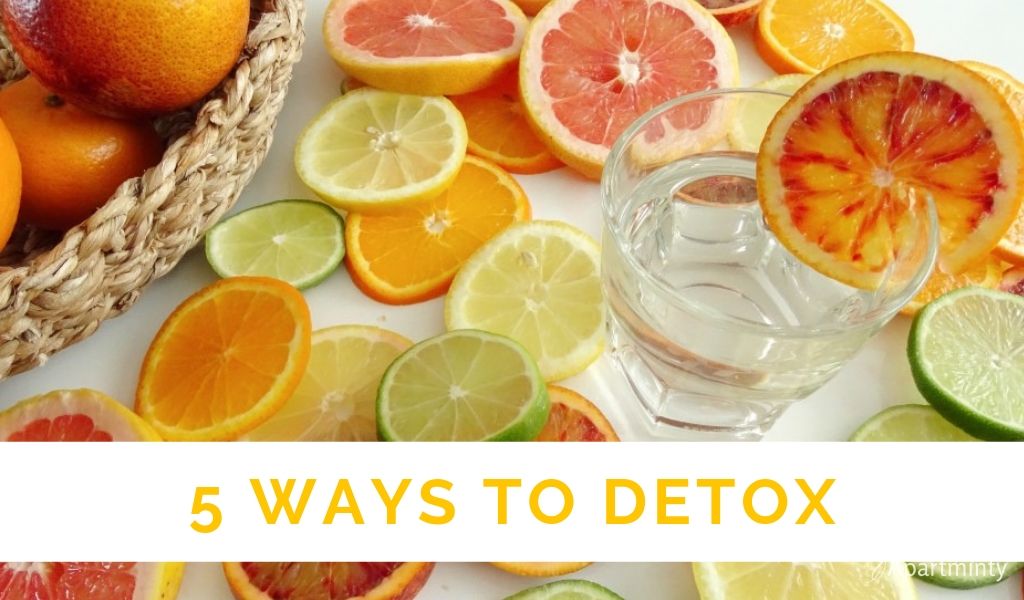
Guest Post
5 Ways to Detox
Do you want to transform into a healthier version of yourself by cleansing your digestive system?
Of course, you do, but you probably don’t want to do that with extreme diets, herbal teas, laxatives, or colonics.
Your body absorbs toxins in several ways, from food to the environmental factors, but it tries to reduce toxins in multiple different ways. These toxins come from the food you consume, the water you drink, and the environment.
Modern medicine, on the other hand, recognized that the accumulation of toxins in your body leads to severe health complications like back pain and sciatica. Toxins wreak havoc on the body and severely impact your muscles. Thus, you need to learn how to detox as the surefire way to muscle strengthening from inside is a good detox plan.
Well, several foods and lifestyle practices can help to improve digestion and relieve bloating, constipation, and gas. Here are the five best ways you can detox your body naturally.
#1: Increase Your Daily Fruits and Vegetable Intake
Try to consume two or more servings of fresh fruit and three or more servings of vegetables every day at a minimum, but ideally a total of six to eight servings a day. If fresh produce is not available, frozen produce is your next best option.
Some examples include broccoli, lettuce, carrots, bell peppers, green beans, artichokes, squash, kale, blueberries, swiss chard, grapes, spinach, strawberries, and oranges.
People with specific digestive conditions may benefit from vegetables higher in soluble (vs. insoluble) fiber like sweet potatoes, carrots, beets, parsnips, rutabagas, potatoes, and turnips.
#2: Try Fiber-Rich Whole Grains
Instead of plain bread, white rice, bagels, and pasta, try consuming gluten-free grains like quinoa (not an actual grain but an herb), brown rice, steel-cut oats, buckwheat, millet, wild rice, and amaranth.
#3: Eat Probiotic-Rich Foods
Foods rich in beneficial live microorganisms are called probiotic bacteria—which can help to improve digestion, decrease inflammation, support the immune system, and enhance the ratio of beneficial to potentially harmful bacteria in the stomach.
Two of the most common probiotics strains are Bifidobacterium bifidum in the large intestine and Lactobacillus acidophilus in the small intestine.
Probiotics are available in supplement form; however, they can also be found in kombucha, kvas, kefir and yogurt (including those made from rice, soy, coconut, and other non-dairy “milks”), and fermented vegetables like kimchi and sauerkraut.
#4: Try Flaxseeds
Flaxseeds are small seeds that provide an exceptional combination of soluble and insoluble fiber and can help with either loose stools or constipation.
The seeds are hard when whole; thus, they should be ground in a blender or spice grinder or coffee before being added to food. The mild, nutty flavor works well sprinkled on salads or oatmeals, and they can be further added to granola, baked goods, muesli, or even smoothies.
#5: Drink More Fluids
Water is essential for optimal digestive function, and yet most of us don’t drink enough water—this includes smoothies, soup, and other fluids too. It’s essential to drink enough fluids when boosting your fiber intake (from fruit, grains, seeds, and vegetables).
Your urine-color can be used as a guide. Usually, straw-colored or pale yellow urine is an indication that you’re getting enough fluids in your system. However, a lot depends on your diet and other health conditions.
Also, remember that certain foods and vitamins can alter the urine-color (such as B vitamins and beets). Try green tea, lemon tea, herbal tea, broth, and plain water.
Other Foods to Include:
- Beans and legumes: Split green and yellow peas and lentils are easily digestible and require less soaking time. Other beans include pinto beans, kidney beans, garbanzo beans (chickpeas), mung beans, and adzuki beans.
- Nuts and seeds: Unsalted nuts, seeds, and nut butters like pumpkin seeds, sesame seeds, chia seeds, sunflower seeds, cashews, almonds, and walnuts.
- Omega-3 fatty acid-rich foods: Steamed, poached or broiled fish in moderation like herring, anchovies, sardines, mackerel, and wild salmon.
- Oil: Coconut oil, avocado oil, and extra virgin olive oil.
Wrapping Up
Part of living a healthy and joyful life is about finding happiness in living. Going to extremes in diet, workout, or detox practices strip us of the healthy life we’re aiming for.
So, if you want to cleanse your body, consider starting by giving your body what it needs to do the job it’s designed to do.
Mary Walton is a professional editor, content strategist, and a part of the NCSM team. Apart from writing, Mary is passionate about hiking and gaming. Feel free to contact her via Facebook.
